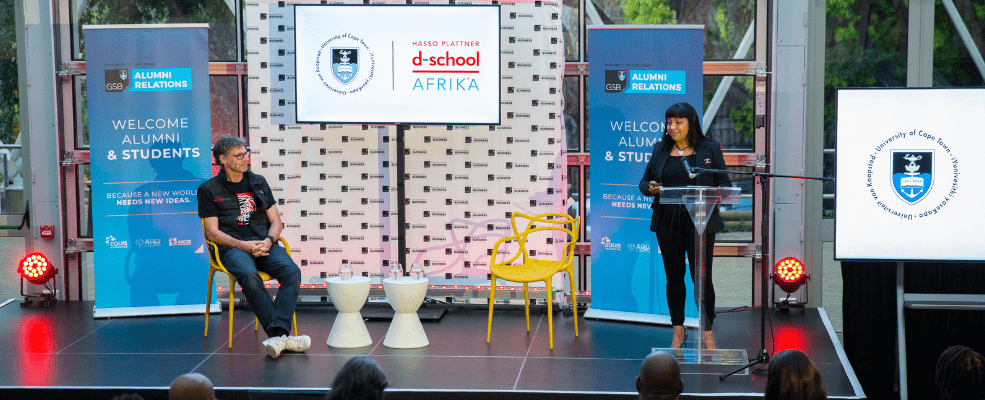
On Thursday, 18 May, the Hasso Plattner d-school Afrika, in partnership with the University of Cape Town Graduate School of Business, launched the inaugural Executive Leadership Convention, a two-day event hosted at the d-school Afrika’s premises on the University of Cape Town’s middle campus.
Richard Perez, founding director of the d-school Afrika and UCT GSB EMBA alum, along with Sean Lewis, guest lecturer on the Executive MBA programme and UCT GSB alum, commenced proceedings with a panel discussion themed ‘Our World and Wicked Problems: Systems and Design Thinking to Tackle the Challenges Leaders Face Today.’
Portia Heynes, acclaimed professional speaker and lecturer on systems thinking, diversity and inclusion, digital transformation, strategy execution and people and talent management, also an alum of the UCT GSB EMBA, moderated the discussion and opened with a presentation that highlighted some of our most perplexing and entrenched social and environmental issues – our wicked problems.
Heynes noted that the boundaries that used to provide the structure of work have been dismantled by technology and AI. She argued that the future of work would not be about roles or titles but rather about capabilities and unique skills as AI begins to take on the administrative and technical features of most jobs and reduces the need for human involvement. Heynes posited that it was now more important than ever for people to upskill and reskill themselves toward roles that would be relevant in the future.
Lewis then provided a portrait of the systems thinker, using Gandalf the Grey from J.R.R. Tolkien’s Lord of the Rings as an analogy. Like Gandalf, Lewis said the systems thinker has a deep understanding of complex systems, a multidisciplinary approach to problem-solving, and a focus on addressing root causes rather than just treating the system.
He described a system as being complex when it is comprised of subsystems, explaining that the people within the subsystems are systems themselves. Each system, he said, is interdependent on the next in order to produce a purpose that is greater than what they can produce on their own. “The complexity resides in the interdependence,” he said.
He then used the example of Cape Town’s water crisis to illustrate the impact of systems thinking when tackling complexity. Although the underlying problem was a lack of water, this wasn’t the cause of the crisis – the root of the issue was our massive consumption.
“We haven’t changed the shortage problem – but we created a change in the overconsumption problem,” Lewis said.
Taking a holistic approach and uniting around a common goal can lead to better results and long-term success, Lewis concluded.
Following on, Perez introduced a modified Danish Design Ladder to explain design-led thinking, indicating that design-led thinking sits at the top of this ladder. “Design Thinking is about teaching people how to see the world through a design lens. It’s about unlocking creative confidence and the mindset to be able to tackle complex challenges.”
He noted, too, the importance of leaders creating exploration environments in which this creative confidence could be unlocked. These are spaces where teams can easily glean qualitative data and delay the need to rush toward the solution space that is sometimes insisted upon prematurely. They are spaces where teams are allowed to “fail early, fail fast, and fail cheaply” – and where they can celebrate that failure, too.
“It’s messy,” he said. “But what you’re doing is bathing in the problem. You explore, make sense, develop ideas, test ideas – and repeat, interlink, weave.”
Questions and comments were then put to the audience, and there was a consensus that language is important when discussing a challenge and that systems thinking and design-led thinking approaches need to be made more accessible to leaders.
Thereafter, the atrium began to buzz with positive chatter and a jazz band started to play. Participants resumed the convention the following day.
Copyright 2025 Hasso Plattner d-school Afrika*